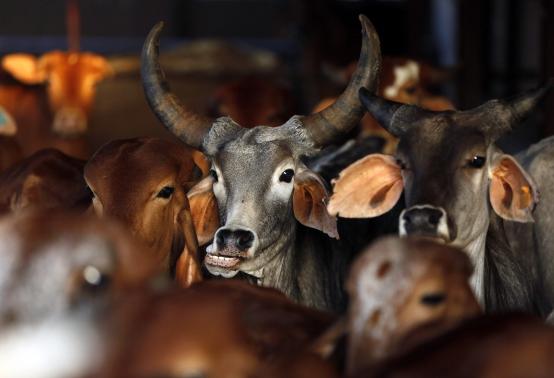
The Haryana government passed legislation in state parliament banning the sale of beef and beef products and killing cows which are considered sacred in officially secular but Hindu-majority India.
"Cow is our mother and we need to protect her at any cost," Haryana agriculture and animal husbandry minister O P Dhankar said after the bill was unanimously passed.
"The law has been framed after studying the laws of different states," he said.
The move by Haryana's Hindu nationalist Bharatiya Janata Party (BJP) government comes after western Maharashtra state this month introduced a ban so strict that even possession of beef could land one in jail for five years.
Right-wing Hindu groups in India have long demanded a complete ban on the slaughter of all cattle, citing religious scriptures.
But the animals' revered status took on extra significance after Prime Minister Narendra Modi's BJP won a landslide general election last May.
The party's election manifesto pledged to work to 'protect cows.'
Maharashtra, which includes the financial hub Mumbai, is also ruled by the BJP in alliance with the far-right Shiv Sena party.
Although Haryana has long banned killing of cows, the new law hikes prison terms to a maximum 10 years if convicted of the crime and fines of up to 100,000 rupees ($1,600).
Similar new penalties apply for selling cows or beef.
India is also one of the world's biggest beef exporters, with Muslims, the country's largest religious minority, the main players in the industry.
Most of what is exported is from male or non-milk-producing water buffaloes, which do not hold the revered status of cows.
Just a dozen Indian states allow buffalo slaughter, with northern Uttar Pradesh, which has a significant Muslim population, the biggest exporter.
Haryana, which borders the capital New Delhi, is also proposing to set up cow sanctuaries or reserves to better protect the animals, thousands of which roam the streets of Indian cities and towns.




1732626034-0/BeFunky-collage-(92)1732626034-0-165x106.webp)


1732618327-2/Untitled-design-(7)1732618327-2-270x192.webp)









COMMENTS (5)
Comments are moderated and generally will be posted if they are on-topic and not abusive.
For more information, please see our Comments FAQ